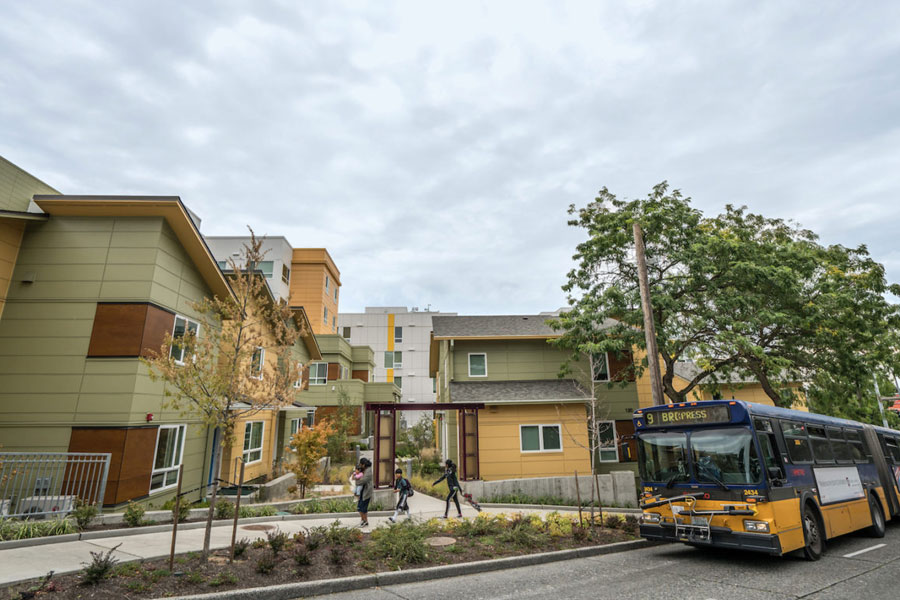Enterprise Community Partners is a respected national organization working to create opportunity for low- and moderate-income people through affordable housing in diverse, thriving communities. An EcoDistricts Organizational Member, Enterprise and EcoDistricts are working together to incorporate principles of sustainability, equity and resilience into neighborhood-scale affordable housing development.
How many employees work at Enterprise Community Partners?
Enterprise has 722 employees in 17 cities, 12 states and Washington, DC.
Why did you become an EcoDistricts Member?
Enterprise Community Partners became an EcoDistricts member for several reasons. First, EcoDistricts provides an important holistic framework for community developers to pursue sustainability goals while advancing the engagement of communities, residents and leadership in their planning. Second, the EcoDistricts network is an invaluable tool that connects us to stakeholders nationwide. Finally, EcoDistricts presents many learning opportunities for us and other members. Their conferences provide excellent examples of organizations across the country that are doing work in resiliency, healthcare and sustainability.
How are our resources and connections influencing your work?
Enterprise and EcoDistricts support many of the same community development groups. In this way, we are collaborating to bring together resources, grants and technical assistance to their training platforms.
The EcoDistricts resources and connections also help us at Enterprise to think more ambitiously about sustainability goals at the neighborhood scale. We’ve been a leader at incorporating sustainability goals and methods into the affordable housing and community development industry at the building level.
We launched in 2004 our Enterprise Green Communities Criteria to bring the improved health, economic and environmental benefits of sustainable construction practices to low-income families. This criteria is the first in the nation to address the unique needs of the affordable housing sector. EcoDistricts has helped us to think more broadly about how to institute our work at the neighborhood scale, which is reflected in our 2015 Enterprise Green Communities Criteria. The updated criteria takes into account buildings’ broader impacts on and connections to the neighborhood and includes Active Design elements to promote resident and community health.
What makes you and Enterprise Community Partners most excited about EcoDistricts?
We are looking forward to the EcoDistricts Summit in Atlanta this October 2017. It will be an opportunity to better get to know this great city and the amazing community activists there. We are also launching a new “Climate and Cultural Resilience” program and will be bringing those partners and their perspective to the Summit.
We will also bring our Enterprise Rose Fellows, a group of innovative change agents in communities across the country, many of whom are working on neighborhood sustainability issues. Launched in 2000, the fellowship is a career path for young architects to support public interest design, partnering emerging designers with community developers for three years. It’s designed to cultivate the next generation of architectural leaders bringing the economic, health and education benefits of quality design to low-income communities. The summit will showcase the good work that is being done nationally and help to accelerate the local work that’s happening.
How are you planning on utilizing the Member benefits in the coming year?
We look forward to participating in many of EcoDistrict’s networking events. In the past, these events have allowed our team to meet many other innovative organizations with ambitious sustainability goals. It’s been a great way to forge relationships and build partnerships with other groups that have similar or complementary missions.
Why are Equity, Sustainability and Resilience important to Enterprise Community Partners?
At Enterprise, our goal is to end housing insecurity, an issue that impacts nearly 19 million low-income families who are homeless or paying more than half of their monthly income on housing. We take a holistic approach to addressing this challenge and as such, equity, sustainability and resilience must be a part of the conversation.
Low-income communities often face the brunt of the damage caused by climate change. During extreme weather events, people of color in low-income communities are typically the first to be affected and the last to recover. Building more resilient, sustainable buildings and neighborhoods for low-income communities will become increasingly important as we continue to grapple with the effects of climate change.
This is why we believe that design excellence must be the norm in the affordable housing industry. Well-designed, sustainable development has the ability to bring its social, economic, environmental and health benefits to low-income communities nationwide.
Original Story: EcoDistricts




































